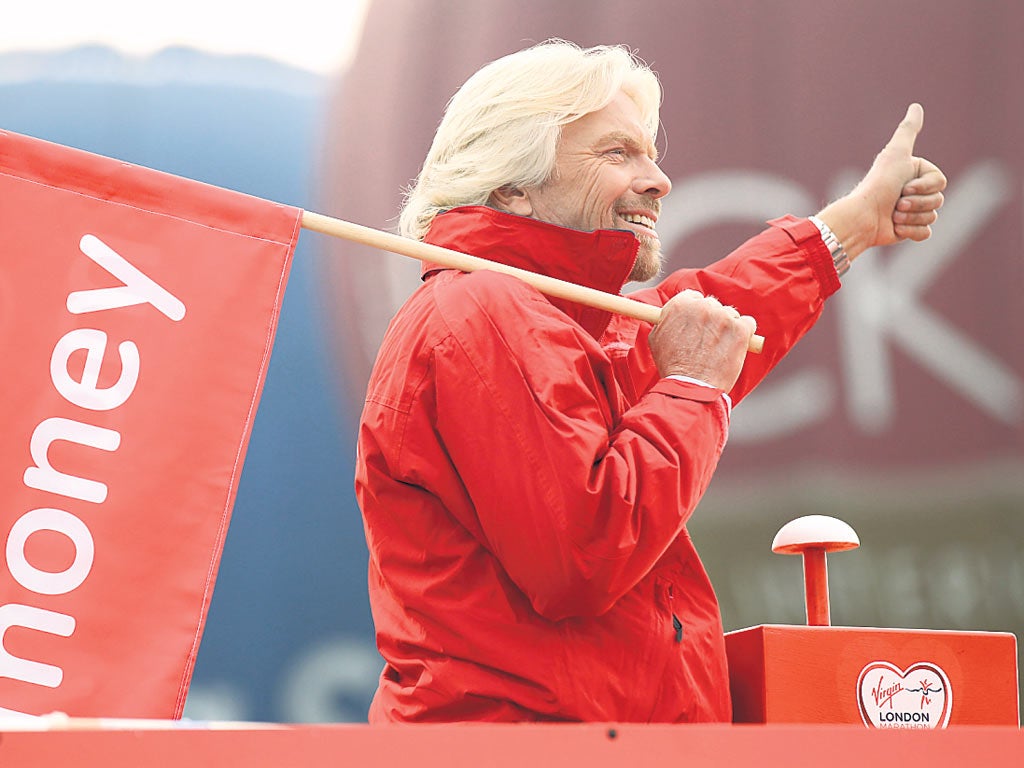Sir Richard Branson under fire for second major deal since space tragedy
Virgin Money relaunched plans to float in London citing 'more stable market conditions'

Your support helps us to tell the story
From reproductive rights to climate change to Big Tech, The Independent is on the ground when the story is developing. Whether it's investigating the financials of Elon Musk's pro-Trump PAC or producing our latest documentary, 'The A Word', which shines a light on the American women fighting for reproductive rights, we know how important it is to parse out the facts from the messaging.
At such a critical moment in US history, we need reporters on the ground. Your donation allows us to keep sending journalists to speak to both sides of the story.
The Independent is trusted by Americans across the entire political spectrum. And unlike many other quality news outlets, we choose not to lock Americans out of our reporting and analysis with paywalls. We believe quality journalism should be available to everyone, paid for by those who can afford it.
Your support makes all the difference.Sir Richard Branson is pressing ahead with plans to pocket millions from the £2bn flotation of the challenger bank Virgin Money, only days after the fatal crash of his Virgin Galactic spaceship.
The billionaire entrepreneur, who visited the disaster site in the Mojave desert and described it as a “horrible setback” but added “the risk is worth it”, had put the listing of his bank on hold last month when global stock markets plunged.
But Virgin Money relaunched its plans to float in London yesterday, saying “more stable market conditions”, as well as the “clarity” provided by the Bank of England on rules about the amount of capital that lenders must hold, meant it expects to list on the London Stock Exchange by the end of this month.
The deal will see Sir Richard sell part of his 46.5 per cent stake in Virgin Money, which is potentially valued at almost £1bn, as will US billionaire Wilbur Ross, who has a 45 per cent stake. The bank’s 2,800 staff, meanwhile, will receive shares worth £1,000 each.
It comes after Sir Richard faced criticism for pressing ahead yesterday with another listing, of the airline Virgin America, just three days after pilot Michael Alsbury died in the Virgin Galactic tragedy. The carrier is hoping to raise $368m (£230m) through a $1bn float in New York; Sir Richard’s Virgin Group has just under a 25 per cent stake.
Commentators have attacked the decision to launch Virgin America’s listing so soon after the disaster of Virgin Galactic’s SpaceShipTwo. In its prospectus, Virgin America admitted its ties to Virgin Group were a potential risk factor, as “any adverse publicity in relation to the Virgin brand name or its principals, particularly Sir Richard Branson... could have a material adverse effect on our business”.
Virgin Money, which last week said profitability had improved in its third quarter, may issue a similar warning, but the bank’s boss Jayne-Anne Gadhia said: “Access to the public capital markets has been a long-term strategic objective for Virgin Money and we are now ready to take this important step forward for our business.”
When its listing plans were unveiled in October, the bank was thought to be aiming for a valuation of about £2bn, raising around £150m. The Government is set to receive £50m from the deal under the terms of Virgin’s acquisition of the “good bank” assets of Northern Rock for £747m.
Both Virgin flotations have been expected by the markets for months. However, Virgin Group confirmed yesterday it now paying for Virgin Galactic out of its own reserves after the space venture exhausted initial investments, including $400m put up by its key partner, the Gulf emirate Abu Dhabi, in exchange for a 37 per cent stake.
A spokesman for Virgin Group said: “We have been running both the space tourism and the commercial satellite development business at Virgin Galactic for some time now and put in place investment to fund the next stage of Virgin Galactic at the end of last year.”
Last month, Sir Richard was hoping that the first commercial space flight could take place in February or March 2015, but the head of the National Transporation Safety Board in the US, which is investigating the crash, said at the weekend the inquiry could take a year.
Join our commenting forum
Join thought-provoking conversations, follow other Independent readers and see their replies
Comments